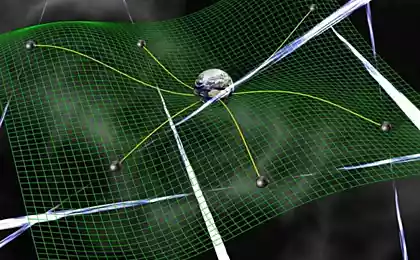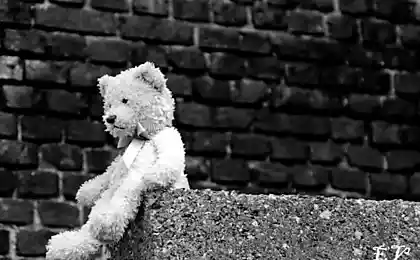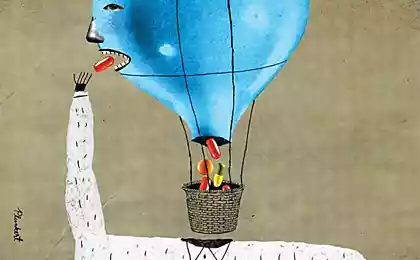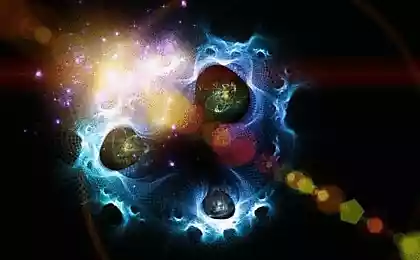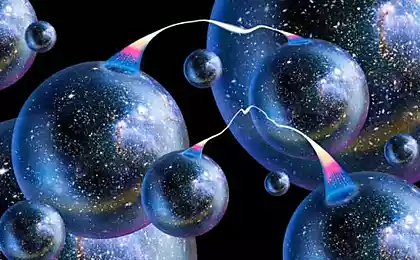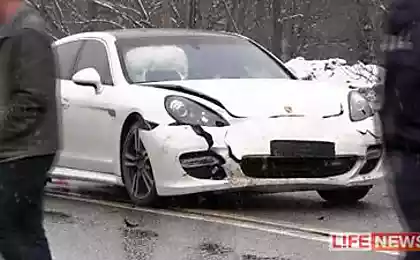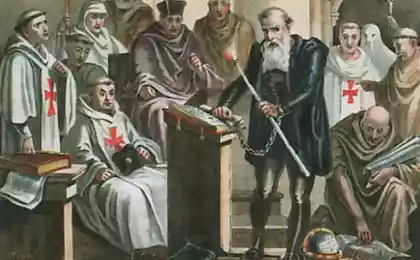687
Julio Granel': Psychoanalytic theory of accidents
In text-based interview Julio Granel "Lecturas del psicoanalíticas accidentarse" Emilia Cueto and magazines ImagoAgenda and ElSigma
An interview with Argentine psychoanalyst Dr. Julio Graniela (Julio Granel), given the sad modern accident statistics, is devoted to an extremely relevant topic, namely, accidents.
In an interview with Dr. Granel ' shares his almost 30-they experience various accidents, the conceptualization of which, today, is at odds with the ideas of classical psychoanalysis. One of these differences is evident in the importance the importance of the Grenelle, building on Bion, takes intuition and hunches. Another extremely interesting point of the theory Julio Graniela is a representation of the relationships of accident with perversion and psychosis.
Ninety million nine hundred ninety five thousand three hundred thirteen
You – a doctor, psychiatrist, training psychoanalyst of the Psychoanalytic Association of Argentina (ARA). At what point you became interested in the study of unconscious processes that lead to accidents?
Actually it all started with the medicine. Accidents caught my attention when I worked for the rescue service assistant at the Department of traumatology. I always wondered what happened in the soul of the victims. It seemed to me strange that people while driving a car took such a distraction or inattention, for example, looked the other side of the road that had an accident. And I thought it was also a kind of disease. It is not so much about broken bones, what in the man were present something that led him to crash. And that "something" associated with bacteria, no hormones, no blood pressure, namely with what happened to him. So I have come to this. Then I began to study psychiatry, psychoanalysis, and I began, of course, reading Freud.
When you worked as a medic in the rescue, have you thought about what direction and what specialty you will work in the future?
I always wanted to study medicine to become a psychiatrist, but while working in the E. R. I was dealing with injuries, wounds, burns. I was a medic and I had to possess General medical knowledge, but accidents aroused my special interest. And then I went to work under care of the doctor, who came from the United States, and he taught me psychological approach to patients with somatic disorders. Then I got a job working in a psychiatric hospital (Sanatorio Flores in Buenos Aires) under the guidance of Professor Gonzalo Bosque (Gonzalo Bosch), one of the prominent psychiatrists of the time. I graduated from the psychiatric medicine and enrolled as an Intern in the clinic Flores, and then I joined the Association of Psychoanalysts Argentina and began a psychoanalytic practice.
What year you joined the Association?
I began teaching in 1951 and in 59-60's implemented in the APA.
Seventy six million four hundred seventy seven thousand nine hundred four
You say that the casualties are not an unfortunate accident, and the response to a "crisis of change" that the subject "can neither resist nor allow it." How the accidents are a "crisis of change"?
Yes, I'm saying this, but I rely on the writings of Freud. Studying psychoanalysis, I discovered "the Psychopathology of everyday life" Freud. In this book he examines the different kinds of everyday mistakes, such as forgetfulness, reservations, clerical, and including accidents. He describes various situations in which people injured by accident, but Freud astutely indicates that they are "as if" random. Based on this, we claim that in fact, "accidents are not accidental". If we recall the philosophical definition of randomness from Aristotle, as something that belongs to matter, and not the person, something people have no control, it is not what we mean by accidents.
What do we mean by accidents, Freud called Vergreifen, which translated from German means something like "to destroy muddled things." That is an accident that change things in a state of confusion. Freud will be the first to say that the casualties are not an unfortunate accident, their causes are unconscious. Thus, I relied on the concepts of Freud, to continue the study and to go further in the description of what happened to the man before him had an accident. Provisions of our theory is the result of reflection and observation for patients, who are in accidents and crisis of change. It's just a theory, which therefore can be either refuted, or extended.
Ninety two million two hundred ninety two thousand two hundred ten
But why, in particular, the crisis of change?
This conclusion is based primarily on our observations. In most of the accidents that we observed and investigated in hospitals, and students of the Center for Psychological Studies and the Prevention of Accidents (CIPEA Centro) carry out work and internship in hospitals, we found following facts: or the patient changed residence, or married, or divorced, or have lost someone from relatives, that is, lived in a crisis situation. Our theory as it asks the question "Why now?"from a psychological point of view. During the crisis of change, people on the one hand the most vulnerable, and on the other hand is experiencing the most upheaval.
Each of us – you, me, everyone – are you ready to experience, say, a certain intensity of life's vicissitudes, but when the circumstances are sudden, sharp, and you are not ready for them, the psychic apparatus begins to unravel, the body begins to unravel, it is necessary to coordinate the functioning of all systems: neurological, hormonal, psychological. And this is a time of crisis. It's like a point of vulnerability, or in the terminology of the road is "dangerous turn".
Fifteen million seven hundred ninety two thousand one hundred nineteen
What place in this process is unconscious fantasies?
Unconscious fantasies play a crucial role in this process, as they give rise to this situation. But they still always relate to something external. Obviously, if a drastic life change was a shock, it is due to an internal problem, external problem is the surface element to the research: one was changed at a time when there was something else. What are unconscious preconditions and the essence of the changes? Why this change was effected in the form of an accident? Unconscious fantasy is of fundamental importance as a source, the basis, but there is also a trigger, "trigger", some external event that creates a conflict between change and avoidance of change.
Psychologically difficult to firmly decide on change than to get into an accident, but if the subject tries to avoid change, it also presents a problem: he is in doubt, directly before the accident he had a kind of bad feeling, which the subject does not understand, not accept, and often even denies that he had some anxiety about change. We watch as the person seems like he's got everything going well, while any hint of change, as a rule, causes in it alarm. Appears dilemma. And when it reaches such force that it cannot be resolved, the conflict transformirovalsya in injury.
In this process, the growing tension in the unconscious, through unconscious fantasies objectified in the accident. An accident becomes a kind of solution to the conflict and the withdrawal of these intolerable mental contents out, as if the conflict remained in vnutripsihicheskoy space and got a large energy load, according to our ideas, it could lead to cancer. We have seen cases of people saying that, "if with me was not an accident, happened to me would have a heart attack". An accident is always finding the opportunity to bring the problem out. We contend that as with the clash between new and old, in a collision with a car the opportunity to Express or to see the conflict in its obvious form.
Sixty eight million four hundred fifty two thousand fifty two
In 1992, you submitted in CIPEA article on the relationship between psychoanalysis and perversion, which carried out a study of the novel "Crash" by James Ballard. What key points would you highlight in this passage?
This novel is interesting because it describes a group of people who study a car accident, but they do it to obtain pervertigo fun. They reported to the police that the car accident occurred, and that they are going to investigate it, to explore, but to explore not to find out the causes of the incident, as we do, and in order to observe the people who got in the accident. To this end, they hired a prostitute who had fake medical certification of a serious injury. And with this, depicting a wounded, female heroes have gone in. This is perversion, their main perversion.
We see this as a metaphor for the fact that every accident contains some degree of perversion. In this novel the main character, whose name is Ballard – the story goes on behalf of the author – also has an accident, his car collides with a car couple. Man dies, and Ballard, experiencing Oedipal excitement, falls in love with his wife and takes her into a sexual relationship. From the point of view of psychoanalysis and psychiatry it can be regarded as a perversion. In General, we pay special attention to the fact that, although a significant role in this vnutripsihicheskoy conflict is the death drive, in every accident there are also libidinal desire, but in their very early regressive form, in the form of incestuous, for example.
Why do you think that the example with the movie "Crash" incest is not associated with Oedipal desire and perversion?
In this case, the subject representerait your Oedipus complex through a stimulating relationship with a woman, injured in a car accident. That is, this woman attracts him precisely because she was injured. We believe, therefore, that here the Oedipus complex is added perverse component
Your wording has to sadomasochism associated with the trauma, getting pleasure from bodily suffering?
The main character of this novel got to the hospital and have experienced the pleasure from his injuries. We can use this as an illustration of the fact that almost every accident scene there is a regression to the sadomasochistic components that, if not for the accident, the subject would be kept in vnutripsihicheskoy space. Contained in this sadomasochistic regression, incestuous desire, has a very primitive, very archaic and perverse nature.
That is, in this case your understanding of perversion is not necessarily a structure, but rather the presence of some perverse components.
That is, the components perversions. The desire of the collision, the pleasure of a collision, the pleasure of causing someone pain, become interrelated here.
Five million three hundred sixteen thousand three hundred seventy seven
In the psychoanalytical theory of accidents draws attention to the fact that "there is no accident without transient psychotic episode with that person who suffered, or caused this accident." Talking about such a formulation?
If this happens, that person does not withstand the crisis of change, but he denies the existence of a conflict, the withdrawal from the conflict experiences of the energy load in its mechanism is similar to the dissipation of the energy load objects from schizophrenic patients. So, there is a schizophrenic, psychotic episode without the presence of schizophrenia or psychosis as a disease. If the subject does not deny the conflict, not avoiding the anxiety that accompanies change, if the subject is consciously resists, and reacts to changes, it does not fall into disaster.
The accident occurs with someone who avoids change, who denies internal and external crisis that accompanied the change, with someone who destroys your inner peace because you have to take energy from all the positive and negative changes in grades, and it essentially is a psychotic act, functional psychosis, which is not thus real psychosis. Likely to become schizophrenic due to the fact that just as is the withdrawal of the energy load of mental representations and their further fragmentation, only in this fragment, that is broken, not the external object, as it happens in case of accident, for example, with the machine, and internal. Thus, different variants of the same mechanism.
The increasing number of accidents around the world, which turns into a real pandemic, can be interpreted as a signal about the state of our society, in which there is a sufficiently high level of anxiety. Although Sigmund Freud believed that anxiety is an integral part of the culture. What other reasons, in addition to the rapid technical progress, allowing to create more and more vehicles moving with the greater speed is, in order that these forms of manifestation of anxiety are predominant?
It seems to me that this issue requires careful further research, but I believe the justification is the fact that at present, patients with borderline level disorders more than neurotic. For example, today the loss of control over the instincts often manifests itself not in the form of neurosis, and in the form of sexual and aggressive acting out, as is typical for borderline patients. As a consequence, acting out as a primitive form of expression of impulses, including an accident as a form of wagering, will receive wide distribution.
The prerequisite for this is, as you absolutely rightly pointed out, the perfection of technique. For example, in some 1600 year could only happen one accident – turning vehicles. The development of technology in some way should happen in parallel and contribute to human development, but it is not. If a person has reduced capacity for the regulation and sublimation of their instincts as erotic and aggressive, a car or crossing the road will provide him more chances of getting into an accident, and this corresponds to the present situation when dominates the action, forms the edge of the clearing trumps traditional neurotic expressions of instincts. People prefer not to think but to act.
Fifty one million one hundred fifty four thousand one hundred forty nine
Subject to whether an accident occurred with a passenger, e.g., passenger bus, train or plane, the same dynamic trends as accident with someone who drove a vehicle?
I would say that, and, first of all, if the person is a companion, who was flying the transport, got into an accident. Because sometimes the satellite can transmit your basic conflict, or his concern for the driver. The passenger caught in the grip of strong aggressive feelings, can direct it to the driver. It is much more difficult to argue in a situation of mass accident, for example, where a plane crash has affected a large number of people. But in any case, the incident stands as a component of the study. For example, if the person was on Board the train, bus or plane, and it was a disaster, and then the man came to a psychoanalyst for a consultation, we will associate this accident with his life, of course, not taking the liberty to declare that he personally has a bearing on the incident. But there are significant and mysterious life story, when some subject is, for example, the bus, the bus gets into an accident, and the passenger survives and is no accident.
One person told us that he was on Board the plane during the crash. There were people who were able to grab the neighbor in the next seat and jump, and there were others that remained motionless and died. This is always a very individual situation. If the subject escaped, we can study his personal history, how he interacted with this unfortunate event, what difference does it make to his life.
You know that accident that killed Carlos Gardel, saved a young man who was his Secretary. This man died a few years ago, aged more than 90 years, and he was just the epitome of hedonism. At that time he lived in Barcelona and Secretary of the halyard was because I speak English. Somehow Gardel was to speak in new York, but knew nothing in English. Then Gardel and hired him to, he acted as interpreter. They became close friends. The young man taught him English, and together they went to Medellin, where the plane crashed. This young man at this time was in the plane, it is located near the exit doors. When asked why he sat there, he said, "because it was closer to the toilet", but in fact it was not so. He had a feeling that something might happen, and he wanted to avoid it. Other passengers in the story rather contributed to the accident. In the biography Grades describes how the pilot told them: "you should go now because in a few hours rise to a strong headwind". And neither Gardel nor his companions wished to change the plans, at the moment they were playing cards, and, continuing the game, they stayed where they had failed. And the guy escaped. He was wounded and received significant burns, but survived and told us his story.
Thirty seven million nine hundred twenty three thousand one hundred seventy nine
You allot an important place to the intuition that psychology and especially in psychoanalysis, is a controversial concept, has been criticized repeatedly. Where do you find her argument?
First, the observations based on the stories of people. For example, one girl with a group of friends were at the party on the occasion of receiving her fiancé, the bachelor's degree. Her fiancé's friend was going to drive the car, and the girl did not want to sit in the car. Even once she had a clear apprehension, never did she mention why she didn't go. But she said, "not that I doubt his driving skills, not at all, just don't want" and she was saved, and one of the guys died. There are actions of this type that force us to make the assumption that there is a certain intuitive idea. There are also vehicle drivers who say they feel like from another angle can go machine, is an example of good intuition, preventing the collision. And there are subjects which on the contrary are in search of a collision. This negative intuition, which provides the possibility of getting in an accident.
On the other hand, I develop many of the ideas of modern psychoanalysts, are loyal supporters of Freud, such as Bion, who said that intuition exists. He claims that there are people who have the ability to anticipate something not represented in the direct form, however, we cannot yet explain and understand exactly how it happens.
Speaking of intuition, apart from memory and desires, not whether you claim you unconscious at any time can have access to the events that haven't happened yet?
Just so. It psychoanalytically, bieniawski, Freudian. Yes, of course. The more conscious memories and desires you have, the more you will. The perception and intuition are also becoming more active. For example, according to Bion, the analyst should ideally not have to work, no memory, no desires. Not that he should be free of desires, but his desires should not dominate over the patient. And to remember that my patient hysterics and told me yesterday so-and-so has no impact on my perception. Bion wrote that it is necessary to break free of all this to be fully open and allow the patient space to Express yourself.
Freely hovering attention…
Yeah, it's maximally expressed form of free floating attention. Bion calls it a little differently, something like "day-dream" (reverie), and today this style is more often used than freely hovering attention.published
Illustrations in the text: John Brosio
Source: tolkoksana.com/2015/03/22/%D0%BF%D1%81%D0%B8%D1%85%D0%BE%D0%B0%D0%BD%D0%B0%D0%BB%D0%B8%D1%82%D0%B8%D1%87%D0%B5%D1%81%D0%BA%D0%B0%D1%8F-%D1%82%D0%B5%D0%BE%D1%80%D0%B8%D1%8F-%D0%BD%D0%B5%D1%81%D1%87%D0%B0%D1%81%D1%82%D0%BD%D1%8B/
An interview with Argentine psychoanalyst Dr. Julio Graniela (Julio Granel), given the sad modern accident statistics, is devoted to an extremely relevant topic, namely, accidents.
In an interview with Dr. Granel ' shares his almost 30-they experience various accidents, the conceptualization of which, today, is at odds with the ideas of classical psychoanalysis. One of these differences is evident in the importance the importance of the Grenelle, building on Bion, takes intuition and hunches. Another extremely interesting point of the theory Julio Graniela is a representation of the relationships of accident with perversion and psychosis.
Ninety million nine hundred ninety five thousand three hundred thirteen
You – a doctor, psychiatrist, training psychoanalyst of the Psychoanalytic Association of Argentina (ARA). At what point you became interested in the study of unconscious processes that lead to accidents?
Actually it all started with the medicine. Accidents caught my attention when I worked for the rescue service assistant at the Department of traumatology. I always wondered what happened in the soul of the victims. It seemed to me strange that people while driving a car took such a distraction or inattention, for example, looked the other side of the road that had an accident. And I thought it was also a kind of disease. It is not so much about broken bones, what in the man were present something that led him to crash. And that "something" associated with bacteria, no hormones, no blood pressure, namely with what happened to him. So I have come to this. Then I began to study psychiatry, psychoanalysis, and I began, of course, reading Freud.
When you worked as a medic in the rescue, have you thought about what direction and what specialty you will work in the future?
I always wanted to study medicine to become a psychiatrist, but while working in the E. R. I was dealing with injuries, wounds, burns. I was a medic and I had to possess General medical knowledge, but accidents aroused my special interest. And then I went to work under care of the doctor, who came from the United States, and he taught me psychological approach to patients with somatic disorders. Then I got a job working in a psychiatric hospital (Sanatorio Flores in Buenos Aires) under the guidance of Professor Gonzalo Bosque (Gonzalo Bosch), one of the prominent psychiatrists of the time. I graduated from the psychiatric medicine and enrolled as an Intern in the clinic Flores, and then I joined the Association of Psychoanalysts Argentina and began a psychoanalytic practice.
What year you joined the Association?
I began teaching in 1951 and in 59-60's implemented in the APA.
Seventy six million four hundred seventy seven thousand nine hundred four
You say that the casualties are not an unfortunate accident, and the response to a "crisis of change" that the subject "can neither resist nor allow it." How the accidents are a "crisis of change"?
Yes, I'm saying this, but I rely on the writings of Freud. Studying psychoanalysis, I discovered "the Psychopathology of everyday life" Freud. In this book he examines the different kinds of everyday mistakes, such as forgetfulness, reservations, clerical, and including accidents. He describes various situations in which people injured by accident, but Freud astutely indicates that they are "as if" random. Based on this, we claim that in fact, "accidents are not accidental". If we recall the philosophical definition of randomness from Aristotle, as something that belongs to matter, and not the person, something people have no control, it is not what we mean by accidents.
What do we mean by accidents, Freud called Vergreifen, which translated from German means something like "to destroy muddled things." That is an accident that change things in a state of confusion. Freud will be the first to say that the casualties are not an unfortunate accident, their causes are unconscious. Thus, I relied on the concepts of Freud, to continue the study and to go further in the description of what happened to the man before him had an accident. Provisions of our theory is the result of reflection and observation for patients, who are in accidents and crisis of change. It's just a theory, which therefore can be either refuted, or extended.
Ninety two million two hundred ninety two thousand two hundred ten
But why, in particular, the crisis of change?
This conclusion is based primarily on our observations. In most of the accidents that we observed and investigated in hospitals, and students of the Center for Psychological Studies and the Prevention of Accidents (CIPEA Centro) carry out work and internship in hospitals, we found following facts: or the patient changed residence, or married, or divorced, or have lost someone from relatives, that is, lived in a crisis situation. Our theory as it asks the question "Why now?"from a psychological point of view. During the crisis of change, people on the one hand the most vulnerable, and on the other hand is experiencing the most upheaval.
Each of us – you, me, everyone – are you ready to experience, say, a certain intensity of life's vicissitudes, but when the circumstances are sudden, sharp, and you are not ready for them, the psychic apparatus begins to unravel, the body begins to unravel, it is necessary to coordinate the functioning of all systems: neurological, hormonal, psychological. And this is a time of crisis. It's like a point of vulnerability, or in the terminology of the road is "dangerous turn".
Fifteen million seven hundred ninety two thousand one hundred nineteen
What place in this process is unconscious fantasies?
Unconscious fantasies play a crucial role in this process, as they give rise to this situation. But they still always relate to something external. Obviously, if a drastic life change was a shock, it is due to an internal problem, external problem is the surface element to the research: one was changed at a time when there was something else. What are unconscious preconditions and the essence of the changes? Why this change was effected in the form of an accident? Unconscious fantasy is of fundamental importance as a source, the basis, but there is also a trigger, "trigger", some external event that creates a conflict between change and avoidance of change.
Psychologically difficult to firmly decide on change than to get into an accident, but if the subject tries to avoid change, it also presents a problem: he is in doubt, directly before the accident he had a kind of bad feeling, which the subject does not understand, not accept, and often even denies that he had some anxiety about change. We watch as the person seems like he's got everything going well, while any hint of change, as a rule, causes in it alarm. Appears dilemma. And when it reaches such force that it cannot be resolved, the conflict transformirovalsya in injury.
In this process, the growing tension in the unconscious, through unconscious fantasies objectified in the accident. An accident becomes a kind of solution to the conflict and the withdrawal of these intolerable mental contents out, as if the conflict remained in vnutripsihicheskoy space and got a large energy load, according to our ideas, it could lead to cancer. We have seen cases of people saying that, "if with me was not an accident, happened to me would have a heart attack". An accident is always finding the opportunity to bring the problem out. We contend that as with the clash between new and old, in a collision with a car the opportunity to Express or to see the conflict in its obvious form.
Sixty eight million four hundred fifty two thousand fifty two
In 1992, you submitted in CIPEA article on the relationship between psychoanalysis and perversion, which carried out a study of the novel "Crash" by James Ballard. What key points would you highlight in this passage?
This novel is interesting because it describes a group of people who study a car accident, but they do it to obtain pervertigo fun. They reported to the police that the car accident occurred, and that they are going to investigate it, to explore, but to explore not to find out the causes of the incident, as we do, and in order to observe the people who got in the accident. To this end, they hired a prostitute who had fake medical certification of a serious injury. And with this, depicting a wounded, female heroes have gone in. This is perversion, their main perversion.
We see this as a metaphor for the fact that every accident contains some degree of perversion. In this novel the main character, whose name is Ballard – the story goes on behalf of the author – also has an accident, his car collides with a car couple. Man dies, and Ballard, experiencing Oedipal excitement, falls in love with his wife and takes her into a sexual relationship. From the point of view of psychoanalysis and psychiatry it can be regarded as a perversion. In General, we pay special attention to the fact that, although a significant role in this vnutripsihicheskoy conflict is the death drive, in every accident there are also libidinal desire, but in their very early regressive form, in the form of incestuous, for example.
Why do you think that the example with the movie "Crash" incest is not associated with Oedipal desire and perversion?
In this case, the subject representerait your Oedipus complex through a stimulating relationship with a woman, injured in a car accident. That is, this woman attracts him precisely because she was injured. We believe, therefore, that here the Oedipus complex is added perverse component
Your wording has to sadomasochism associated with the trauma, getting pleasure from bodily suffering?
The main character of this novel got to the hospital and have experienced the pleasure from his injuries. We can use this as an illustration of the fact that almost every accident scene there is a regression to the sadomasochistic components that, if not for the accident, the subject would be kept in vnutripsihicheskoy space. Contained in this sadomasochistic regression, incestuous desire, has a very primitive, very archaic and perverse nature.
That is, in this case your understanding of perversion is not necessarily a structure, but rather the presence of some perverse components.
That is, the components perversions. The desire of the collision, the pleasure of a collision, the pleasure of causing someone pain, become interrelated here.
Five million three hundred sixteen thousand three hundred seventy seven
In the psychoanalytical theory of accidents draws attention to the fact that "there is no accident without transient psychotic episode with that person who suffered, or caused this accident." Talking about such a formulation?
If this happens, that person does not withstand the crisis of change, but he denies the existence of a conflict, the withdrawal from the conflict experiences of the energy load in its mechanism is similar to the dissipation of the energy load objects from schizophrenic patients. So, there is a schizophrenic, psychotic episode without the presence of schizophrenia or psychosis as a disease. If the subject does not deny the conflict, not avoiding the anxiety that accompanies change, if the subject is consciously resists, and reacts to changes, it does not fall into disaster.
The accident occurs with someone who avoids change, who denies internal and external crisis that accompanied the change, with someone who destroys your inner peace because you have to take energy from all the positive and negative changes in grades, and it essentially is a psychotic act, functional psychosis, which is not thus real psychosis. Likely to become schizophrenic due to the fact that just as is the withdrawal of the energy load of mental representations and their further fragmentation, only in this fragment, that is broken, not the external object, as it happens in case of accident, for example, with the machine, and internal. Thus, different variants of the same mechanism.
The increasing number of accidents around the world, which turns into a real pandemic, can be interpreted as a signal about the state of our society, in which there is a sufficiently high level of anxiety. Although Sigmund Freud believed that anxiety is an integral part of the culture. What other reasons, in addition to the rapid technical progress, allowing to create more and more vehicles moving with the greater speed is, in order that these forms of manifestation of anxiety are predominant?
It seems to me that this issue requires careful further research, but I believe the justification is the fact that at present, patients with borderline level disorders more than neurotic. For example, today the loss of control over the instincts often manifests itself not in the form of neurosis, and in the form of sexual and aggressive acting out, as is typical for borderline patients. As a consequence, acting out as a primitive form of expression of impulses, including an accident as a form of wagering, will receive wide distribution.
The prerequisite for this is, as you absolutely rightly pointed out, the perfection of technique. For example, in some 1600 year could only happen one accident – turning vehicles. The development of technology in some way should happen in parallel and contribute to human development, but it is not. If a person has reduced capacity for the regulation and sublimation of their instincts as erotic and aggressive, a car or crossing the road will provide him more chances of getting into an accident, and this corresponds to the present situation when dominates the action, forms the edge of the clearing trumps traditional neurotic expressions of instincts. People prefer not to think but to act.
Fifty one million one hundred fifty four thousand one hundred forty nine
Subject to whether an accident occurred with a passenger, e.g., passenger bus, train or plane, the same dynamic trends as accident with someone who drove a vehicle?
I would say that, and, first of all, if the person is a companion, who was flying the transport, got into an accident. Because sometimes the satellite can transmit your basic conflict, or his concern for the driver. The passenger caught in the grip of strong aggressive feelings, can direct it to the driver. It is much more difficult to argue in a situation of mass accident, for example, where a plane crash has affected a large number of people. But in any case, the incident stands as a component of the study. For example, if the person was on Board the train, bus or plane, and it was a disaster, and then the man came to a psychoanalyst for a consultation, we will associate this accident with his life, of course, not taking the liberty to declare that he personally has a bearing on the incident. But there are significant and mysterious life story, when some subject is, for example, the bus, the bus gets into an accident, and the passenger survives and is no accident.
One person told us that he was on Board the plane during the crash. There were people who were able to grab the neighbor in the next seat and jump, and there were others that remained motionless and died. This is always a very individual situation. If the subject escaped, we can study his personal history, how he interacted with this unfortunate event, what difference does it make to his life.
You know that accident that killed Carlos Gardel, saved a young man who was his Secretary. This man died a few years ago, aged more than 90 years, and he was just the epitome of hedonism. At that time he lived in Barcelona and Secretary of the halyard was because I speak English. Somehow Gardel was to speak in new York, but knew nothing in English. Then Gardel and hired him to, he acted as interpreter. They became close friends. The young man taught him English, and together they went to Medellin, where the plane crashed. This young man at this time was in the plane, it is located near the exit doors. When asked why he sat there, he said, "because it was closer to the toilet", but in fact it was not so. He had a feeling that something might happen, and he wanted to avoid it. Other passengers in the story rather contributed to the accident. In the biography Grades describes how the pilot told them: "you should go now because in a few hours rise to a strong headwind". And neither Gardel nor his companions wished to change the plans, at the moment they were playing cards, and, continuing the game, they stayed where they had failed. And the guy escaped. He was wounded and received significant burns, but survived and told us his story.
Thirty seven million nine hundred twenty three thousand one hundred seventy nine
You allot an important place to the intuition that psychology and especially in psychoanalysis, is a controversial concept, has been criticized repeatedly. Where do you find her argument?
First, the observations based on the stories of people. For example, one girl with a group of friends were at the party on the occasion of receiving her fiancé, the bachelor's degree. Her fiancé's friend was going to drive the car, and the girl did not want to sit in the car. Even once she had a clear apprehension, never did she mention why she didn't go. But she said, "not that I doubt his driving skills, not at all, just don't want" and she was saved, and one of the guys died. There are actions of this type that force us to make the assumption that there is a certain intuitive idea. There are also vehicle drivers who say they feel like from another angle can go machine, is an example of good intuition, preventing the collision. And there are subjects which on the contrary are in search of a collision. This negative intuition, which provides the possibility of getting in an accident.
On the other hand, I develop many of the ideas of modern psychoanalysts, are loyal supporters of Freud, such as Bion, who said that intuition exists. He claims that there are people who have the ability to anticipate something not represented in the direct form, however, we cannot yet explain and understand exactly how it happens.
Speaking of intuition, apart from memory and desires, not whether you claim you unconscious at any time can have access to the events that haven't happened yet?
Just so. It psychoanalytically, bieniawski, Freudian. Yes, of course. The more conscious memories and desires you have, the more you will. The perception and intuition are also becoming more active. For example, according to Bion, the analyst should ideally not have to work, no memory, no desires. Not that he should be free of desires, but his desires should not dominate over the patient. And to remember that my patient hysterics and told me yesterday so-and-so has no impact on my perception. Bion wrote that it is necessary to break free of all this to be fully open and allow the patient space to Express yourself.
Freely hovering attention…
Yeah, it's maximally expressed form of free floating attention. Bion calls it a little differently, something like "day-dream" (reverie), and today this style is more often used than freely hovering attention.published
Illustrations in the text: John Brosio
Source: tolkoksana.com/2015/03/22/%D0%BF%D1%81%D0%B8%D1%85%D0%BE%D0%B0%D0%BD%D0%B0%D0%BB%D0%B8%D1%82%D0%B8%D1%87%D0%B5%D1%81%D0%BA%D0%B0%D1%8F-%D1%82%D0%B5%D0%BE%D1%80%D0%B8%D1%8F-%D0%BD%D0%B5%D1%81%D1%87%D0%B0%D1%81%D1%82%D0%BD%D1%8B/

